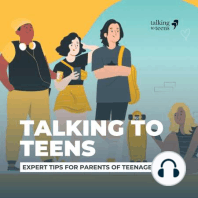18 min listen

Ep 240: The Perfectionist’s Guide to Parenting
Ep 240: The Perfectionist’s Guide to Parenting
ratings:
Length:
26 minutes
Released:
May 7, 2023
Format:
Podcast episode
Description
Katherine Morgan Schafler, author of The Perfectionist’s Guide to Losing Control, busts myths on perfectionism. Many people wear perfectionism as a badge of honor, but in reality it is a maladaptive behavior that can make parenting more difficult than it already is!Tallo is a digital portfolio platform where your teen can apply for scholarships, internships, and opportunities. Check them out at https://bit.ly/tallotalkingtoteens Visit our website, https://bit.ly/talkingtoteenswebsite, to sign up for our newsletter so you'll never miss an episode!Today's show contains a discussion on suicide. If you or a loved one is in crisis, please call the US National Suicide Prevention Lifeline at (800)-273-TALK or (800) 273-8255. You can also text them via Crisis Text Line (text HOME to 741741). All services are free, confidential and available 24 hours a day, seven days a week.Show Notes (00:00) Introduction to Perfectionism (and Katherine!)Katherine shares her background in psychotherapy and how she came to specialize in perfectionism. Plus, the modern shift of “perfectionism” meaning “balanced”—and yet how being “balanced” is often exhausting in today’s world! As Katherine notes, “...if you're feeling out of balance, do less, not more.”We also discuss the two perfectionist modes: adaptive and maladaptive. Perfectionism is not inherently bad. It’s incredible that humans can have an ideal in their minds and set to work to create a more “perfect” reality. Healthy perfections know the ideal is meant to inspire. Unhealthy perfections conflate achievement and inspiration. Katherine shares two questions we can ask to determine if someone’s (or our) perfectionism is adaptive/healthy or maladaptive/unhealthy. (11:40) - Perfectionism and Self-Worth Katherine helps us explore how perfectionism is often misconstrued. We discuss how people often use the term "perfect" to describe moments that are complete, but not necessarily flawless. Often when someone says they had a “perfect” day, they mean there was nothing missing, not that every single moment was flawless. Feeling we are not perfect can sometimes manifest in sneaky ways. Katherine presents how exalting others can sometimes be a down-judgment on our own character. Saying things like “Well of course she can land that job” or “It makes sense the coach gave him the award,” is actually a down-judgment on ourselves. Katherine clues me in on ways we can recognize the talents of others , without overlooking our own awesomeness. (18:50) The Teen Brain, Dramatics, and SuicideKatherine and I talk about how the teen brain does feel emotions more keenly and more intensely because it is still developing. In many respects, this makes our teens more vulnerable to big emotions. With rising rates of teen suicide, Katherine encourages parents to speak to their teens directly. She believes the single most important question parents can ask that might save their teen’s life from suicide is: “Have you ever thought about ending your life?” She shares why it works…To listen to the full episode, become a member! Visit talkingtoteens.com
Released:
May 7, 2023
Format:
Podcast episode
Titles in the series (100)
Ep 1: Success and Getting What You Want in Life: Bill Deresiewicz, bestselling author of Excellent Sheep, talks about the conversations he had with students that really had an impact when he was teaching at Yale and Columbia. His advice for how to do this with your own teen involves being non-judgmental by Talking To Teens: Expert Tips for Parenting Teenagers